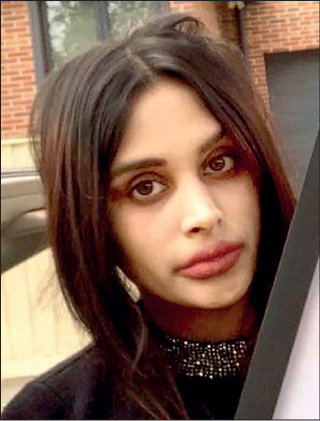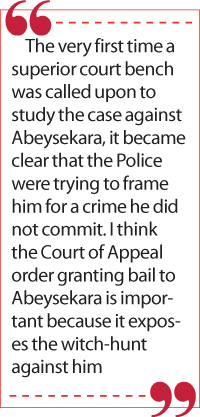Friday Feb 20, 2026
Friday Feb 20, 2026
Friday, 25 June 2021 00:00 - - {{hitsCtrl.values.hits}}
Days after former CID Director SSP Shani Abeysekara was enlarged on bail by the Court of Appeal, questions remain about his continued security, and the fate of the criminal investigations he conducted and supervised. One of the most consistent and vociferous voices in defence of the top sleuth has been activist Ahimsa Wickrematunge. In this interview, Ahimsa outlines her expectations for emblematic criminal cases going forward, both in Sri Lanka and abroad.
Excerpts follow:
 |
| Former CID Director SSP Shani Abeysekara |
 |
| Activist Ahimsa Wickrematunge
|
Q: You entered the public spotlight in 2019 by writing about your father’s murder and then filing litigation seeking justice. But in the last year, you have spoken far more about SSP Shani Abeysekara and other causes. Why did you change your focus?
I have not pursued any action in my father’s case in Sri Lanka since November 2019 as I believe it would be futile. A commission was set up to rule that my father’s murder should never have been investigated and that all the investigators should be punished. All the prime suspects, military officers, have received promotions and rewards since November 2019. The Government is not on the side of justice and is actively derailing my father’s case.
I tried raising issues where I could, like when a suspect accused of destroying evidence in my father’s case was not arrested but instead appointed Director of the CID and put in charge of my father’s murder investigation. I was able to prove it with the support of Prime Minister Mahinda Rajapaksa and then Speaker Karu Jayasuriya. But the Police Commission did nothing and the Opposition still refuses to take up the issue.
But when it comes to Shani Abeysekara, it is not just me. We all have a duty to fight for him. From the moment Gotabaya Rajapaksa became President – ordering Abeysekara’s sacking from the CID was the very first thing the Defence Secretary did after assuming duties on 20 November 2019. Adding insult to injury, he was transferred to Galle as a personal assistant. Abeysekara is probably the most skilled criminal investigator in Sri Lanka. In a long and illustrious career at the CID, Abeysekara and his team cracked some of the most complex criminal cases. Most of these investigations led to successful prosecutions by the Attorney General. It was clear to me from the outset that Abeysekara was being targeted by the Government for his role in investigating the murder of my father and other atrocities committed at a time when the current President served as Defence Secretary of Sri Lanka.
By relentlessly pursuing justice against my father’s killers and those who abducted and tortured other journalists like Prageeth Eknaligoda and Keith Noyahr in the face of continuous political obstruction, Abeysekara knowingly put himself in harm’s way. I could not in good conscience abandon him to his fate when he was facing such cruel injustice, with virtual zero support from the Opposition leadership. Despite our collective efforts, Abeysekara remained imprisoned for 11 long months. It still breaks my heart that this forthright, fearless Police officer had to spend even a single night in a jail cell as punishment for the ‘crime’ of investigating atrocities.
Q: Sandhya Eknaligoda, wife of disappeared journalist Prageeth, also said that news of Shani Abeysekara’s release on bail ‘healed a wound that was festering inside her since his arrest’. In fact, she apologised publicly for not fighting hard enough for his release. Why does SSP Abeysekara evoke this strong response from victims?
Sandhya Eknaligoda, of all people, has nothing to apologise for. Activism cost her children one parent. Given that her husband’s indicted murderers have now been lionised and promoted to the highest echelons of the military, it could have been suicide for her to speak out sooner. As a child who had one parent murdered, I cannot imagine having had to endure that agony twice over. But I understand why she feels guilty. Until Abeysekara and his team took over investigations into my father’s killing and the disappearance of journalists like Prageeth, grieving families had spent years begging for justice.
The only reason we know what happened to my father Lasantha Wickrematunge to Prageeth Eknaligoda, Keith Noyahr, Upali Tennakoon, Poddala Jayantha, Nandaraja Raviraj and Joseph Pararajasingham and to so many others is because of fearless investigators like Nishantha Silva and Abeysekara. It was never lost on my family, or the families of any of the victims, that these officers were risking their lives to pursue justice in such cases. They were openly threatened by individuals linked to the Government that now holds power. Even in opposition these killers were forces to be reckoned with.
This Government tries to paint Abeysekara as a political operative, to discredit his investigations which have implicated allies of this regime. That is not how victims perceive Abeysekara and his team of officers. To us, they were the first public officers in Sri Lanka to answer our pleas for justice and accountability. I have never met Abeysekara. But I know him by reputation to be an officer of integrity with a strong sense of duty. For doing his job, for trying to deliver justice to my family and families like mine who had also been victimised, Shani was handcuffed in front of his own family, and dragged off to jail. Every day that he spent in jail upset me deeply. I am sure campaigners like Sandhya Eknaligoda felt the same. To those of us who have been seeking justice for atrocities committed against our loved ones for so long, officers like Abeysekara are heroes.
 Q: People may have been more silent at the time of his arrest, but more recently, people have begun to speak up about Shani Abeysekara. What do you think caused this swing in public opinion?
Q: People may have been more silent at the time of his arrest, but more recently, people have begun to speak up about Shani Abeysekara. What do you think caused this swing in public opinion?
As the months wore on, and every effort on the part of Abeysekara’s lawyers to secure bail proved futile, I think it became clear that his imprisonment was a political witch-hunt. A reprisal against his work as a criminal investigator. Abeysekara was in jail for nearly a year. In that time, I believe the eyes of the Sri Lankan people have been opened. The Government’s tactics of repression have become clearer. We all see the prolonged political detention of people like lawyer Hejaaz Hizbullah and the young writer Ahnaf Jazeem.
In the past year, many witnesses have claimed that the police tried to coerce them to make false statements implicating Hizbullah and Abeysekara. The arrest of a young man who encouraged other motorists to honk in protest against a VIP convoy cemented the idea that this Government is paranoid about criticism and public disquiet over its actions. I think all these things had an impact. It became clear that Abeysekara, Hizbullah and others were the victims of targeted persecution by the Government.
The very first time a superior court bench was called upon to study the case against Abeysekara, it became clear that the Police were trying to frame him for a crime he did not commit. I think the Court of Appeal order granting bail to Abeysekara is important because it exposes the witch-hunt against him.
Q: Earlier this year, you filed a complaint with the UN Human Rights Commission seeking justice for your father’s extra-judicial killing. There is clear interest in Sri Lanka and impunity for human rights crimes in the island at the UN now. Do you see yourself addressing the Human Rights Council in Geneva one day to campaign for justice for your father?
To those who are trying to evade justice for killing my father, my promise is simple. They cannot run and hide forever. Immunities and renunciations will only buy time. Whether in Sri Lanka, another country, or an international tribunal, they will answer for this atrocity. There is no escape. When it comes to seeking justice for my father’s murder, no option is off the table.
For so many years my family hoped that the Sri Lankan authorities would find his killers and bring them to justice. But 12 years have passed since my father was murdered on Colombo’s streets. We have watched helplessly as politician after politician promised to find and prosecute his killers. Instead, all they did was obstruct investigations and undermine efforts to uncover the truth about who killed my father and why, by Police officers like Abeysekara and his team.
I look forward to the day I can finally move on with my life but know I cannot rest until there is accountability for those who ripped my family apart. The United Nations continues to highlight the Lasantha Wickrematunge murder as a case of emblematic impunity in Sri Lanka. This gives me hope that the UN understands the grief and struggle of victims like my family. I will stop at nothing to find the answers I seek and bring my family closure and peace.
Q: The UN will set up an evidence database of human rights abuses and alleged war crimes that have taken place in Sri Lanka, including emblematic cases like Lasantha Wickrematunge’s assassination in 2009. You filed legal action in the US against current President Gotabaya Rajapaksa, accusing him of involvement in your father’s murder. Will you share information with this UN Evidence Mechanism?
Last year, I lodged a complaint to the Police Commission. If there is to be justice, it is essential that evidence be effectively preserved for future criminal proceedings. It would be ideal if those proceedings could one day be held in Sri Lanka, but if it remains to be the case that the Sri Lankan judicial system shows more lenience towards those charged with atrocities than those investigating them, we will have no choice but to use whatever evidence we can gather in whatever the best available forum is. I fully support the UN mechanism and encourage anyone who has credible evidence of atrocities by any party, including the LTTE or other terrorist groups, to trust the mechanism without reservation.
 Q: Your father led the most fascinating life of any journalist in Sri Lanka, and has had the most symbolic reputation since his death. Are you concerned with his story being lost to history as time wears on? Have you considered writing a book or helping to create a documentary or feature film to ensure that his story is told and lives on with time?
Q: Your father led the most fascinating life of any journalist in Sri Lanka, and has had the most symbolic reputation since his death. Are you concerned with his story being lost to history as time wears on? Have you considered writing a book or helping to create a documentary or feature film to ensure that his story is told and lives on with time?
My family has talked about this a lot. Many years ago, my mother wrote a book about my father and the experiences they shared together. I was alive for so little of my father’s time in journalism and so little of his career, that I feel that is a story best told by others. If I will have a story to tell one day, it will be the story of bringing his killers to justice. I can’t rule out writing a book, but it is more likely that I will lend my support to more experienced or professional authors to do justice to the story. I have some comfort with writing and authors, so this is an easier project to consider.
Documentaries can be tricky. I should warn victims who may be approached to do documentaries – Do your homework, and only work with reputable, high integrity professionals. We must tell our stories, but we also shouldn’t let our families or our traumas be exploited for commercial gain. I don’t know too many people in that industry, and the few experiences my family has had with others trying to produce documentaries about my father, although many years ago, have been harrowing. We may be biased by bad experiences, but our memories of working with people trying to produce documentaries about my father are largely of abuse, exploitation, harassment and greed. Maybe one day the right person or team, someone ethical with true passion and dedication will come along and we can explore starting from scratch, but I am not thinking of documentaries right now. I’m thinking of justice.
Q: When you tweeted about SSP Abeysekara’s release on bail, you mentioned that there were new fears for his safety. Can you elaborate? Why do you think he might be in danger?
I have no doubt that those who kept Abeysekara imprisoned for nearly a year on fabricated charges tried to refuse him medical attention when he contracted COVID-19 and suffered a serious attack and led a slanderous and falsified campaign of propaganda against his credibility and his work, will continue to find ways to harm him. This makes me fearful for his safety, and I sincerely hope his legal team and his friends and family have taken all measures necessary to ensure he will remain unharmed.
Abeysekara’s investigations came too close to revealing the truth about the perpetrators behind atrocities committed when this Government was last in office. Powerful people have a vital interest in concealing the information Abeysekara and his team uncovered during their criminal investigations. For this reason, I do not believe he will ever be safe in Sri Lanka, as long as perpetrators like my father’s killers, Prageeth’s abductors and Keith Noyahr’s torturers remain at large.